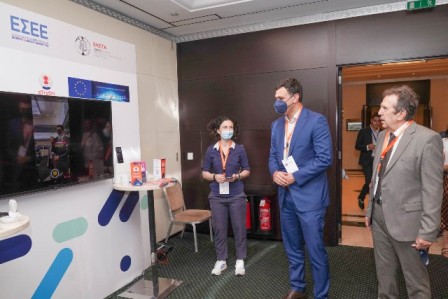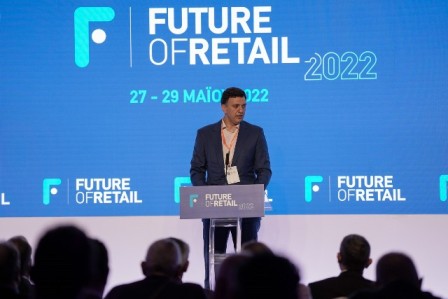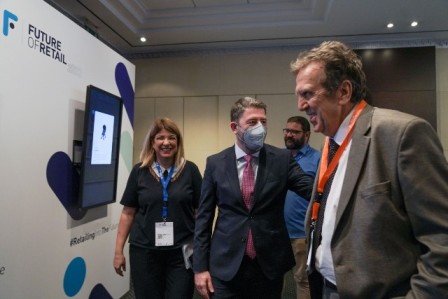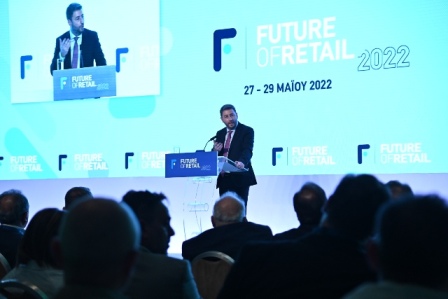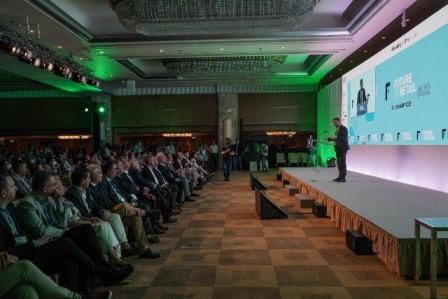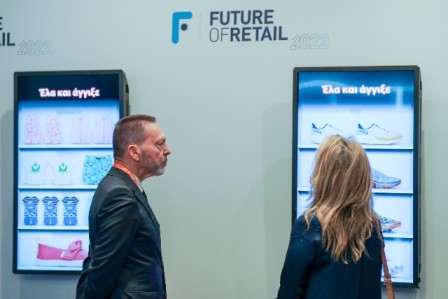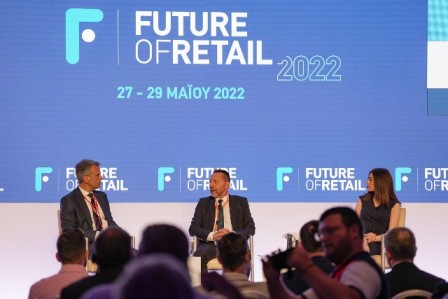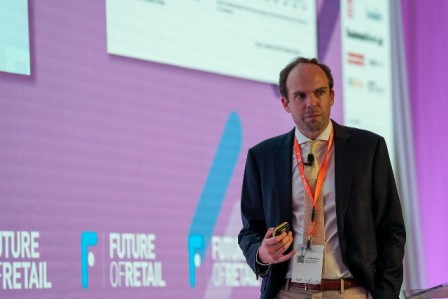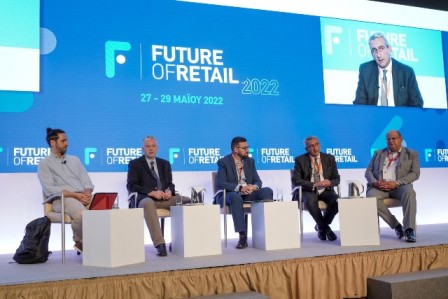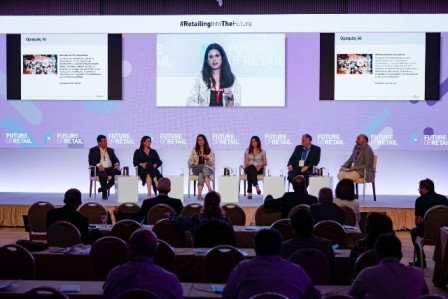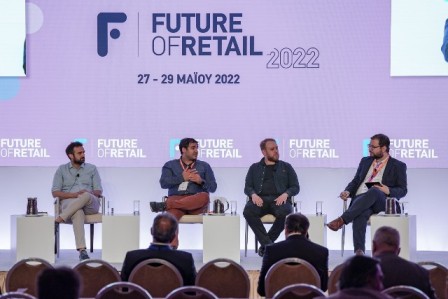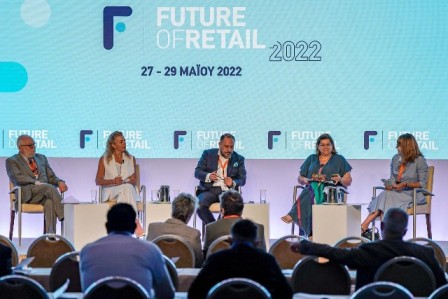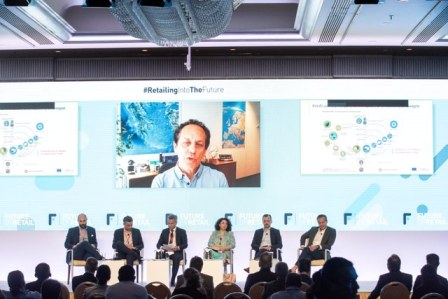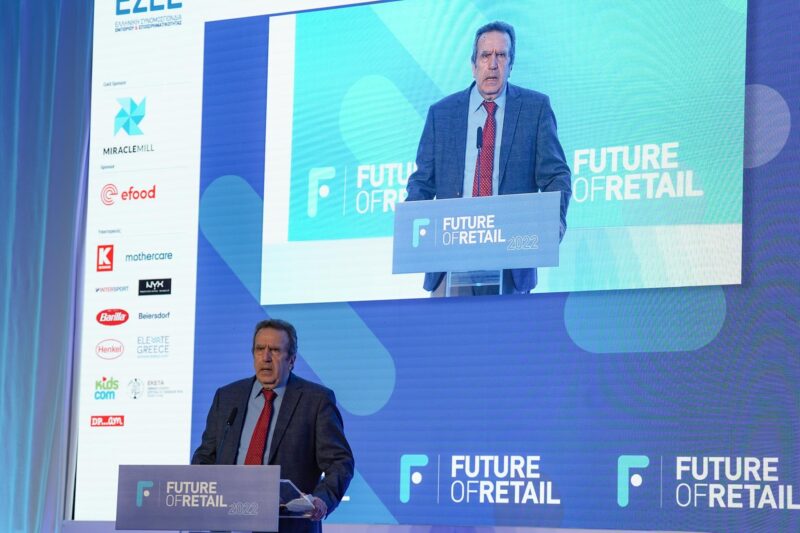
90 Greek and foreign speakers contributed to consolidating the “culture of digital and green transition” in the Greek commercial enterprise.
The vision of the sustainable development of the Greek retail trade presupposes an understanding of the complex changes due to the global economy’s rapid digitization and “green” transition. The international Conference Future of Retail, 2022 of ESEE made a decisive contribution to the consolidation of the “culture of transformation” in the Greek commercial enterprise, which approached holistically for 2+1 days – with 90 speakers from Greece and abroad – the “image of the future” physical and online store.
Particularly positive comments were received by ESEE’s innovative initiative to organize the Retail Technology Exhibition “Retail Innovation Lab” in the three days of May 27-29 within the framework of the Conference, enabling more than 800 delegates – the Presidents of trade associations and business owners from all over the country, the representatives of the world’s leading retail organizations, the participants in the thematic sections (Presidents, CEOs and specialized company executives and academics) – to see up close, “navigate” and be informed about the digital technologies that make up the forming a “hybrid” store of the digital age.
In the main hall of the Conference, during the 2nd day of work, the thematic sections and keynote speeches were mainly concerned with the concept of sustainability and its effects on retail trade, the applications of artificial intelligence and intelligent transactions and their integration into the operation of the commercial business, the impact of technology on work and business, and the challenges of delivering products to consumers. Also, the possibilities of expanding synergies between the tourism and trade sectors, as well as the process of financing commercial SMEs from the country’s banking system, were extensively analyzed.
The European Retail 2040 Report, implemented by the Insight Foresight Institute with the support of the European Commission, was also presented.
THEMATIC SECTIONS – SPEECHES – PRESENTATIONS / Saturday 28/5
- The European Retail 2040 Exhibition – Presentation by Mr Totti Könnölä, Managing Director Insight Foresight Insitute
Mr. Totti Könnölä made a comprehensive presentation of the project “The E.U. retail ecosystem of the future – a vision for 2040,” supported by the European Commission and implemented by the consortium “Foresight on Demand.” The specific project, which started in the summer of 2021, will last until the end of 2022 and is based on five pillars:
a) in the mapping of the European ecosystem in the field of retail sales,
b) in tracing the horizon of retail trade,
c) the mapping of future scenarios,
d) in shaping the vision but also charting a course for how and where we will go in the future, and finally,
e) in submitting policy proposals.
Mr. Könnölä described that in Europe’s retail ecosystem, the two most important developments are the digital and the green transition. The entry of new market players has brought about reshuffles in who provides the products/services (e.g., B2B / B2C / C2C platforms) and changes in the use of services and products. He argued that a critical feature of the European ecosystem is the empowerment of the main points of interaction for purchasing decisions and added that a new role has now been formed for retail outlets to play. Specifically, he expressed that today’s physical store is now a center of entertainment or experience. Still, it can also be a production center (e.g., indoor crops or three-dimensional printing (3D) shops in supermarkets or shopping malls but also a point of concentration for recycling used products such as electronic devices and clothing. Mr. Könnölä argued that the future of retail will be customer-oriented and recognize customers’ value orientation and diversity. He emphasized that a new business model is emerging, offering integrated Omni-channel solutions, e.g., for customer journey management, mobile, social, web personalization, advertising, content distribution, etc. It also believes that the diversity of stores and combining online shopping with physical stores is a prerequisite for the so-called “15-minute city” and the revival of city centers that offer sustainable, local, and regional products. He pointed out that the retail business model goes far beyond selling products and that the industry is increasingly moving towards service integration around customer-business relationships and personalized offers. In closing, he emphasized that the shift towards digitization and the green economy is significant as it affects the value chain, from food production to services and recycling.
The Head of International Relations of ESEE, Mrs. Milena Panagiotopoulou, moderated the discussion with Mr. Könnölä.
- The link between tourism and retail
The Conference thoroughly explored the possibilities of maximizing the benefits for the tourism and trade sectors and the Greek economy from their cooperation.
In his speech, the Minister of Tourism, Mr. Vassilis Kikilias, emphasized:
“Our national strategy is to link retail with the tourism sector to maximize the benefits for the Greek economy and the average Greek family. Tourism products, the primary sector, and Greek trade feed each other. The Greek land produces products promoted to health stores, hotels, and accommodations in our country. With the project we are implementing at the Ministry of Tourism, we are “illuminating” small islands and winter destinations, taking action for the tourism recovery of Athens, and opening up new markets. This network of interventions strengthens the Greek brand and stimulates retail.”
In the following section on the topic: “The footprint of tourism on retail,” the discussion focused on the adverse effects that the pandemic had on tourism and retail trade. It was pointed out that both sectors are transforming rapidly but amid solid challenges, especially about new technologies. For this reason, European resources should be used in such a way as to encourage staff training and, more generally, culture change. In particular, the Regional Governor of N. Aegean, Mr. Georgios Hatzimarkos, referred to the importance of tourism in his Region in favor of the monoculture of tourism. The doctorate of EKPA, Mr. Michalis Nikolakakis, recognized the importance of technology but at the same time underlined the need to complete Face Retail Trade, which should speak the same language as Tourism. Mr. Nikos Vassiliou, President of the INVIAN Institute, emphasized the importance of adapting businesses to quality and changing culture and education using the EFQM model. Finally, Mr. Ilias Kikilias, Director General of INSETE, identified the channels connecting tourism and retail trade. At the same time, he emphasized that the exact relationship is difficult to quantify accurately, considering that access to credit and debit card data will be necessary.
Mr. Manolis Manioudis, Scientific Associate of INEMY – ESEE, coordinated the thematic section.
- The fashion industry after the pandemic
The discussion touched on the importance of retail sustainability in the fashion industry and the intense upheaval caused by the pandemic. This sub-sector is undergoing rapid transformation, with the energy crisis exerting additional pressures. Now, the tendency to reuse products is emerging dynamically, as well as the importance of supporting local production units. In particular, Mrs. Ellis Kiss, journalist, and fashion Feature Director of Vogue Greece, considers that fashion has moved into a new day with sustainability characteristics, collaborations between large companies, the preference for TikTok over advertisements, and the metaverse era with digital portraits. Mr. Dimitris Matemtzis, President and CEO of Intrafashion Group (Pink Woman), underlined the importance of local physical stores after the pandemic as the need for direct physical purchases increases but also the importance of prevention, trusting relationships with consumers, and capital adequacy. Mrs. Agni Anastasiou, Business Unit Director NYX (L’Oréal Greece), focused mainly on ethical sustainability and innovations in the field, such as the applications of virtual cosmetics or virtual faces, emphasizing the importance of technology in the area. Mr. Meletis Karabinis, Councilor of the Association of Ready-to-Wear Manufacturers, announced that the European Commission has just laid the foundations for a new fashion economic system for the coming years, stressing that the sector needs a sound industrial policy for successful transformation.
Journalist Mrs. Efi Falida moderated the discussion.
- Keynote Speech: Scott Case: “Sustainable Development Goals Contain Opportunities for Commercial Enterprises”
Starting his excellent speech, Mr. Scott Case, vice president of the National Retail Federation in the USA, noted that retail trade, as an industry, is at the center of global reality. He pointed out that an essential condition for sustainability is cooperation and synergies, noting that the reason arises from the fact that it is incredibly complicated to define what sustainability is. The complexity lies in its multidimensional nature: climate change, supply chain, labor, and food. According to Scott Case, there are three trends that retail should follow in its move toward sustainability. The first trend is understanding changing consumer patterns. According to Scott Case, consumers realize that everything they consume has an environmental impact, especially for young people. The second trend is transparency, and the third is artificial intelligence (Artificial Intelligence), which has two dimensions: voluntary and mandatory. In general, as pointed out by Mr. Case, in the transformation of commerce and the consequent transition, data will help commercial enterprises make correct decisions. Focusing on sustainability, consumption should create net positive environmental, social, and community benefits as every product purchase has health, environmental, and societal footprints. Reducing energy use, water consumption, and low waste footprint are critical. However, according to Mr. Case’s highly insightful narrative, this can only be achieved through partnerships and synergies. For Mr Case, the Sustainable Development Goals (SDGs) hold business opportunities if companies decide to work together. In closing, Mr. Case highlighted again the importance of cooperation for the successful transition towards sustainability.
- Trade and Sustainability
The participants emphasized that using raw materials and sustainability are vital priorities today. Repairing, reusing, reselling, and renting products are constantly gaining ground, while there has been questioning whether green resources have been used correctly. Our country can follow sustainable support models by making full use of technology. More specifically, Mr. Ilias Iakovides, European Commission DG Connect and advisor on Green and Digital Transformation matters characterized the cooperation with suppliers as critical. At the same time, he argued that recycling is the end of the product’s life, so we must delay it as much as possible, preferring instead “repair – reuse – retail.” Mr. Haris Doukas, Associate Professor at the National Technical University of Athens, highlighted machine learning and blockchain processes as critical for the supply chain, stressing in any case that green is less. Ms. Andrianna Sarantopoulou, Marketing Director of S/M Galaxias, pointed out the company’s actions to limit the environmental footprint, stressing that technology can work supportively. Mr. Michalis Tsagarakis, Marketing Manager S/M Chalkiadakis, characterized the need for adaptation as imperative, described the company’s actions to support the environment and society, and emphasized that we have no one left behind in this effort. Mr. Constantinos Loizou, CEO of EMBIO Diagnostics Ltd, pointed out that the pandemic has violently turned our lives upside down with technology being able to provide solutions. Mr. Stavros Kafounis, the businessman, underlined the importance of synergy with all involved (staff, competitors, local authorities) and that the collaboration culture is changing.
Journalist Mr. Giorgos Kouros moderated the panel.
- Governor of the Bank, Mr. Yiannis Stournaras, said, “SMEs of trade had the lead of all sectors in new loans from 2020 until the 1st quarter of 2022.”
The Governor of the Bank of Greece, Mr. Yiannis Stournaras, in a fascinating discussion with the journalists Mr. George Kouros and Mrs. Eleni Stergiou, referred to the financing of Trade and Small and Medium Enterprises by the Banks and the Recovery and Resilience Fund. Mr. Stournaras cited data according to which in the two years 2020-2021, the companies belonging to the trade sector received more than 1/5 of the total credit extension to the companies of the non-financial sector (21.4%, based on the net financing flow), which was the second highest share after that of industry. During this time, commercial enterprises were financed more than all other sectors through the programs of the Hellenic Development Bank on favorable terms (primarily through the Guarantee Fund for enterprises financially affected by the pandemic).
Mr. Stournaras emphasized: “Based on the Bank of Greece’s AnaCredit data on new loan disbursements (not net flows, i.e. here the debt payments paid by the borrowers are not deducted from the new loans) given to non-financial companies, it is found that SMEs of the trade sector absorbed around 40% of new SME loans in 2020, 23% in 2021 and 25% in the first quarter of 2022, the highest of any subsector in these periods—a sector lead of trade among small and medium-sized enterprises – followed by manufacturing SMEs with approximately 19% in these periods. Across all businesses (SMEs and large businesses) from all sectors, commercial businesses absorbed the highest proportion of new loans (26%) in 2020 and the second highest after manufacturing in 2021 and Q1 2022 (17, 5%, and 19.5%, respectively). Although the participation rates of the sector fell compared to 2020, there is nevertheless an increase in the share of total new loans (both of commercial SMEs and of all companies in the sector) by two percentage points between 2021 and the first quarter of 2022.”
- Innovative Transactions & New Trends in Payments
The discussion focused on the effects of the pandemic on the digital transition in the field of payments and specifically on the familiarization of businesses and consumers with new technologies. Mrs. Stavroula Kambouridou, CEO of DIAS – INTERBANK SYSTEMS S.A., emphasized that the pandemic favored interbank transactions since there was a 17% increase in 2021, while 60% of consumers are looking for contactless transactions and 56% do not wish to have a wallet on them physical form as trust has now been regained in the digital wallet and mobile phone. He emphasized that due to the pandemic, the percentage of consumers who shop online has significantly increased, with most of them making transactions from their mobile phones instead of a laptop, desktop computer, etc. In closing, he pointed out three key payment points: security, convenience, and immediacy. Mr. Vassilis Koutentakis, Executive Member of the Board, Senior General Manager – Chief Retail Banking Piraeus Bank, argued that financial institutions were making great strides in digitization and that the state was making even more significant strides. He argued that transactions have been simplified, although emphasis must be placed on security. He emphasized that the physical store will continue to play an important role and that the use of financial tools that will support businesses’ digital transition efforts is of decisive importance. He emphasized that it is essential for banks and companies to take initiatives in this direction, arguing for the necessity of a single platform for payments. Mr. Alexandros Kelaiditis, Co-Founder of Flexin, argued that “think tech” has developed enough for the consumer’s benefit and that a corresponding development must be made at the business level. Entrepreneurs must adapt to the new order of things since 30% of payments are made through checks. Therefore, he emphasized that digitization is inevitable because it will significantly facilitate the work of businesses and consumers’ lives. Mr. Petros Karalis, Sales Director of EPSILON NET, noted that the pandemic was decisive in digitization. He argued that I.T. can provide solutions in the field of payments. He said that Multichannel prices are possible while solutions save costs and time and are carried out securely. The connection with AADE will facilitate digitization while the work of small businesses can be significantly enhanced by adopting a small but effective information system with which they can monitor customers and their preferences.
The discussion was moderated by the journalist Mr. Tasos Zachos.
- Artificial intelligence in retail
The panel highlighted how MMEs can use A.I. applications. Ms. Savina Papadakis, Advisor in digital & consumer policy at Eurocommerce, referred to the fact that at the European level, there have now been a series of actions to promote artificial intelligence technologies under the umbrella of the “Coordinated Plan” for the Member States. Traditional brick-and-mortar stores have a range of data they can analyze using native applications. The main aim should be to enable the use of artificial intelligence by most businesses. Mrs. Denia Kanellopoulou, Innovation Services specialist at NCSR Dimokritos, presented the digital technology hub “ahead” and its services to companies to transform digitally. He defined artificial intelligence as “a strategic investment for a company,” identifying its application in customer service and improving the customer experience, among other things. He noted that data is available everywhere, so the best possible analysis and utilization is necessary. Valia Papadimitriou, co-founder and CEO of DEVA, argued that artificial intelligence helps the MME entrepreneur to get to know his customer as a human being, especially in how external factors influence his behavior. These are technologies that are accessible to everyone and that allow drilling down by product code. Mr. Vangelis Stamatoukos, Advisor for growth Dataviva, explained using artificial intelligence for forecast applications. Mr. Nestoras Louizidis, Head of New Business Apifon, spoke about promoting tools for collecting and processing customer data to offer better services.
The moderator of the panel, journalist Dimitris Mallas, summarized the discussions in the following three axes:
- First, A.I. is not a robot,
- second, artificial intelligence has far-reaching applications and helps retail businesses to improve their competitiveness and productivity;
- third, artificial intelligence is not just about big business.
- The challenge of distribution
The panel discussed the criticality of distribution during the pandemic. Mr. Nikos Vardavoukas, VP of Brand & Customer Public Group, analyzed the company’s business model, which was affected by changes in the global supply chain. The group emphasized the construction of a giant warehouse for e-commerce in Greece, with 100,000 codes. Mr. Stefanos Katsimbas, Business Director of Skroutz Last Mile, referred to the creation of Last Mile, which enabled the company to cover 20,000 daily orders. He mentioned the company’s use of electric vehicles and the practice of lockers. Mr. Haris Takas, Senior Q- Commerce & Logistics of food, spoke about how vital digital transformation is for the company. He expressly referred to the expansion of the company’s activities during the pandemic due to the increased demands of consumers.
The moderator of the panel was the journalist Mr. Christos Kotsakas.
- Keynote Speech: Dr. Carl Benedikt Frey: “The ‘boom’ of telecommuting boosts online sales but cuts spending in city centers”
Dr. Carl Benedikt Frey, Director of the University of Oxford’s Future of Work Laboratory, pointed out in his fascinating account that we should understand how digitization changes social relations. He pointed out that technology is changing transportation costs while transforming consumption and production patterns. At this level, the process of “reshoring” (the return of a company’s production facilities to the country where it is headquartered) is expected to bring businesses back to Western Europe, creating new challenges and opportunities. The intensity of reshoring is likely to intensify due to automation. One of the structurally affected sectors is retail trade, while the professions expected to be most affected are those of low wages. Dr. Frey noted that the 4th Industrial Revolution is expected to increase the productivity of the private sector and will reduce the number of workers. However, economic history data showed that automation and increased unemployment negatively decrease tax revenues and increase crime. Dr. Frey commented that the world is becoming more horizontal with the dramatic increase in telecommuting attesting to it. Finally, through his penetrating intervention, he showed the adverse effects of telecommuting on the level of expenditure of workers in city centers. For Dr. Frey, the eventual demise of downtown businesses may translate into increased online shopping, empowering “superstar” businesses. At this level, he pointed out the crucial role of public investments in strengthening small and medium-sized enterprises.
- The impact of technology on work and business
Taking over from Dr. Frey, the panelists discussed the multifaceted effects and changes brought about by the development of digital technologies at work. Mr. Michalis Argyrou, Professor of Economics at the University of Piraeus and Head of Economic Advisers to the Minister of Finance, recognized the existence of a digital gap between Greece and the European average and analyzed it both from the supply side, the digital background, i.e., for digital activities and on the demand side for such activities. He emphasized the use of the Recovery Fund to bridge the digital divide and the need for SMEs to understand the benefits of digital transformation. Mr. Kostas Papadakis, Senior Social Dialogue and Governance Specialist of the ILO, emphasized the contribution of digital transformation to creating new jobs. He mentioned three challenges that, in the ILO’s view, characterize the new digital age. The first challenge is technological unemployment; the second challenge is the polarization of labor between high demand for well-paid jobs with digital skills and low-skilled jobs and between reduced demand for middle-skilled workers. The third includes increasing disparities between high- and low-skilled jobs and strengthening informal work in middle-skilled positions. In his opinion, the three challenges should be addressed by programs to acquire new digital skills and enhance social dialogue. Mrs. Georgia Petraki, Professor at the Department of Social Policy of Panteion University, presented a series of critical thoughts about digital transformation. He questioned who benefits from the technological change, pointed out that the replacement of life by digital work is not empirically confirmed, referred to the phenomena of the “great resignation” and cross-platform appointment, talked about the deterioration of working conditions and the reduction of working time and discussed the new digital channels of communication and collaboration and their broader social impact. Mr. Konstantinos Agrapidas, Director General, Labor Relations, Health, Safety and Work Integration at the Ministry of Labor and Social Affairs and Doctor of Panteion University, highlighted how critical retail is for the Greek economy and, by extension, how imperative the strategy is of its digital upgrade with the help of the state. It highlighted the challenge of new digital skills and the emotional resilience that should accompany work in the new era. Mr. Dimitris Papadimitriou, founder of Startup Pathways, spoke about the horizontal skills that accompany technology and how digital transformation can take place in SME entrepreneurship. He mentioned the need for re-skilling and new-skilling and what kind of brand the retail trade should have in the country. In her intervention, Mrs. Maria Syrengela, Deputy Minister of Labor and Social Affairs responsible for Demographic Policy and the Family, argued that Greece must adapt to the digital transformation and the changes it brings to work. Retraining throughout the working life is necessary, as well as strengthening gender equality in the workplace. He also referred to the public-private partnership and argued that “the employee is the internal customer of the business,” so his satisfaction with working conditions, pay, and prospects should be among its priorities.
Mr. Christos Goulas, General Director of INE/GSEE, PhD, coordinated the discussion.
- Speech by the President of PASOK – KINAL, Mr. Nikos Androulakis
The President of PASOK-Movement for Change, Nikos Androulakis, spoke about the lack of a strategic plan on behalf of New Democracy and SYRIZA for the economy’s future, resulting in exposure and vulnerability to global developments. He insisted that the government was handling the Recovery Fund as an enlarged NSRF without a vision of modernizing the economy and gave specific examples of aspects of the welfare state, such as Health and Social Housing, which were not a priority for the government when planning the direction of the European funds. Tool. Referring to the wave of precision and the increased energy costs, Mr. Androulakis underlined that the fiscal expansion that the government proceeded with during the pandemic crisis had resulted in “running out of “fuel” as there is no fiscal space to relieve citizens from energy accuracy.”
Mr. Androulakis emphasized that effective management of private debt and bad loans is required. “He who had mortgaged his property to finance his enterprise cannot be worse off than he who had no security. A real second chance for dignity, with criteria, is needed for those who tried and failed,” he said characteristically.
Finally, he highlighted PASOK-Movement for Change’s proposal to impose a ceiling on the retail price of electricity “to ensure a fair distribution of costs between the private state and the producer” as well as the need for “taxation of the actual surplus profits of energy companies and not of those appearing today.”

